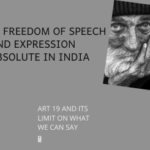Article 19 ambit: Not just state, even pvt citizens can face challenge: Basics Explained

The article talks about the latest judgment by the Supreme Court(SC) in which it expands the scope of Art 19 to include private citizens also . As per the constitutional provision it was enforced against the State.
A fundamental right under Article 19/21 can be enforced even against persons other than the State or its instrumentalities,” said the 4-1 majority ruling by the Constitution Bench Tuesday. The Supreme Court has, effectively, extended the ground for seeking these rights against other citizens. The court took this view while ruling that the right of free speech and expression guaranteed under the Article 19(1)(a) cannot be curbed by any additional grounds other than those already laid down in Article 19(2). This interpretation could also bring an obligation on the state to ensure private entities also abide by Constitutional norms.
Article 19 which guarantees freedom of speech and expression is a right invoked against the state. Some fundamental rights such as those prohibiting untouchability, trafficking and bonded labour are explicitly against both the state and other individuals.
The SC, also referred to several foreign jurisdictions, noted a shift in US law from a “purely vertical approach” to a “horizontal approach”.
A vertical application of rights would mean it can be enforced only against the state while a horizontal approach would mean it is enforceable against other citizens.
For example, a horizontal application of the right to life would enable a citizen to bring a case against a private entity for causing pollution, which would be a violation of the right to a clean environment.
LEARNING FROM HOME/ FROM CLASSES/ BASICS
Article 19 in The Constitution Of India
The idea behind this article is to give voice to the Indian citizen the license to express thoughts with some reasonable restrictions.
The principle behind freedom of speech and expressions is as under:
- Only the Indian citizen has the liberty to enjoy this right, the right isn’t given any foreign citizen.
- This right gives liberty to express one’s view through any medium e.g.:-by words in writing speaking, in pictures etc.
- Since the freedom of speech and expression is not an absolute right, the government is given powers to frames law for and against it
- Protection of certain rights regarding freedom of speech etc
(1) All citizens shall have the right
(a) to freedom of speech and expression;
(b) to assemble peaceably and without arms;
(c) to form associations or unions;
(d) to move freely throughout the territory of India;
(e) to reside and settle in any part of the territory of India; and
(f) omitted
(g) to practise any profession, or to carry on any occupation, trade or business
(2) Imposes reasonable restrictions on the exercise of the right conferred by the said sub clause in the interests of the sovereignty and integrity of India, the security of the State, friendly relations with foreign States, public order, decency or morality or in relation to contempt of court, defamation or incitement to an offence
Although Article 19 does not express provision for freedom of protest but the fundamental right of the freedom of protest implicit in the right the freedom of speech and expression.
LEARNING FROM HOME/ WITHOUT CLASSES/ BASICS Article 21 reads as:
“No person shall be deprived of his life or personal liberty except according to a procedure established by law.” Article 21 applies to natural persons. The right is available to every person, citizen or alien. Thus, even a foreigner can claim this right.
It is the only article in the Constitution that has received the widest possible interpretation. It has a much wider meaning which includes right to live with human dignity, right to livelihood, right to health, right to pollution free air, etc.
The Supreme Court took the view that “procedure established by law” in Article 21 means procedure prescribed by law as enacted by the state and rejected to equate it with the American “due process of law.”
But, in Maneka Gandhi v Union of India the Supreme Court observed that the procedure prescribed by law for depriving a person of his life and personal liberty must be “right, just and fair” and not “arbitrary, fanciful and oppressive,” otherwise it would be no procedure at all and the requirement of Article 21 would not be satisfied. Thus, the “procedure established by law” has acquired the same significance in India as the “due process of law” clause in America.
The purpose of infusing a right with a constitutional element is precisely to provide it a sense of immunity from popular opinion and, as its reflection, from legislative annulment. Fundamental rights are the only constitutional firewall to prevent State’s interference with those core freedoms constituting liberty of a human being.
[i] A statutory right can be modified, curtailed or annulled by a simple enactment of the legislature. In other words, statutory rights are subject to the compulsion of legislative majorities.
READ: Supreme Court expands Article 19 ambit: Not just state, even pvt citizens can face challenge | India News,The Indian Express




0 Comments